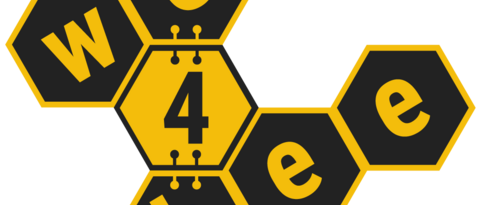Machine Learning for Ecosystems and Climate Modeling
In the past few years, applying data science and machine learning to ecosystems, environmental & climate data has become a central research area at our chair. We have successfully developed deep learning methods for improving climate models in the BigData@Geo project as well as the follow up project BigData@Geo 2.0 as well as machine learning-based air pollution models in the EveryAware and p2Map project. We’re also analyzing data from smart beehives to understand bee behavior and detect anomalies as swarming events in the we4Bee and BeeConnected projects.
Projects
Concluded Projects
-
EveryAware - A project for collaborative collection of environmental sensor data with low cost sensors.
-
p2Map - Learning understandable maps of air pollution leveraging a combination of low-cost mobile sensors.
Publications
-
 ConvMOS: climate model output statistics with deep learning. . In Data Mining and Knowledge Discovery, 37(1), pp. 136–166. 2023.
ConvMOS: climate model output statistics with deep learning. . In Data Mining and Knowledge Discovery, 37(1), pp. 136–166. 2023. -
 DynaBench: A Benchmark Dataset for Learning Dynamical Systems from Low-Resolution Data. . In Machine Learning and Knowledge Discovery in Databases: Research Track, D. Koutra, C. Plant, M. Gomez Rodriguez, E. Baralis, F. Bonchi (eds.), pp. 438–455. Springer Nature Switzerland, Cham, 2023.
DynaBench: A Benchmark Dataset for Learning Dynamical Systems from Low-Resolution Data. . In Machine Learning and Knowledge Discovery in Databases: Research Track, D. Koutra, C. Plant, M. Gomez Rodriguez, E. Baralis, F. Bonchi (eds.), pp. 438–455. Springer Nature Switzerland, Cham, 2023. -
 Swarming Detection in Smart Beehives Using Auto Encoders for Audio Data. . In 2023 30th International Conference on Systems, Signals and Image Processing (IWSSIP), pp. 1–5. 2023.
Swarming Detection in Smart Beehives Using Auto Encoders for Audio Data. . In 2023 30th International Conference on Systems, Signals and Image Processing (IWSSIP), pp. 1–5. 2023. -
 Automatic Speech Detection on a Smart Beehive’s Raspberry Pi. . In LWDA 2023 - Learning, Knowledge, Data, and Analysis. 2023.
Automatic Speech Detection on a Smart Beehive’s Raspberry Pi. . In LWDA 2023 - Learning, Knowledge, Data, and Analysis. 2023.- [ BibTeX ]
-
 ConvMOS: Climate Model Output Statistics with Deep Learning. . In Data Mining and Knowledge Discovery, P. Cellier; K. Dembczynski; A. Zimmermann; E. Devijver (eds.). Springer, 2022.
ConvMOS: Climate Model Output Statistics with Deep Learning. . In Data Mining and Knowledge Discovery, P. Cellier; K. Dembczynski; A. Zimmermann; E. Devijver (eds.). Springer, 2022. -
 A sensor-driven approach for analyzing a beehive’s state. . 2022.
A sensor-driven approach for analyzing a beehive’s state. . 2022. -
 Evaluating the multi-task learning approach for land use regression modelling of air pollution. . In Journal of Physics: Conference Series, 1834(1), p. 012004. IOP Publishing, 2021.
Evaluating the multi-task learning approach for land use regression modelling of air pollution. . In Journal of Physics: Conference Series, 1834(1), p. 012004. IOP Publishing, 2021. -
 NeuralPDE: Modelling Dynamical Systems from Data. . 2021.
NeuralPDE: Modelling Dynamical Systems from Data. . 2021. -
 Anomaly Detection in Beehives: An Algorithm Comparison. . In International Conference on Sensor Networks, Vol. 1674 of Communications in Computer and Information Science, A. Ahrens, R. Prasad, C. Benavente-Peces, N. Ansari (eds.), pp. 1–20. Springer, 2021.
Anomaly Detection in Beehives: An Algorithm Comparison. . In International Conference on Sensor Networks, Vol. 1674 of Communications in Computer and Information Science, A. Ahrens, R. Prasad, C. Benavente-Peces, N. Ansari (eds.), pp. 1–20. Springer, 2021. -
 Detecting Presence Of Speech In Acoustic Data Obtained From Beehives. . In DCASE Workshop. 2021.
Detecting Presence Of Speech In Acoustic Data Obtained From Beehives. . In DCASE Workshop. 2021.- [ BibTeX ]
-
 Semi-Supervised Learning for Grain Size Distribution Interpolation. . In Pattern Recognition. ICPR International Workshops and Challenges: Virtual Event, January 10--15, 2021, Proceedings, Part VI, pp. 34–44. Springer International Publishing, 2021.
Semi-Supervised Learning for Grain Size Distribution Interpolation. . In Pattern Recognition. ICPR International Workshops and Challenges: Virtual Event, January 10--15, 2021, Proceedings, Part VI, pp. 34–44. Springer International Publishing, 2021.- [ BibTeX ]
-
 Density-based weighting for imbalanced regression. . In Machine Learning, A. Appice; S. Escalera; J. A. Gamez; H. Trautmann (eds.). 2021.
Density-based weighting for imbalanced regression. . In Machine Learning, A. Appice; S. Escalera; J. A. Gamez; H. Trautmann (eds.). 2021. -
 OpenLUR: Off-the-shelf air pollution modeling with open features and machine learning. . In Atmospheric Environment, 233, p. 117535. 2020.
OpenLUR: Off-the-shelf air pollution modeling with open features and machine learning. . In Atmospheric Environment, 233, p. 117535. 2020. -
 MapLUR: Exploring a New Paradigm for Estimating Air Pollution Using Deep Learning on Map Images. . In ACM Trans. Spatial Algorithms Syst., 6(3). Association for Computing Machinery, New York, NY, USA, 2020.
MapLUR: Exploring a New Paradigm for Estimating Air Pollution Using Deep Learning on Map Images. . In ACM Trans. Spatial Algorithms Syst., 6(3). Association for Computing Machinery, New York, NY, USA, 2020. -
 Deep Learning for Climate Model Output Statistics. . In Tackling Climate Change with Machine Learning Workshop at NeurIPS 2020. 2020.
Deep Learning for Climate Model Output Statistics. . In Tackling Climate Change with Machine Learning Workshop at NeurIPS 2020. 2020. -
 Evaluating the multi-task learning approach for land use regression modelling of air pollution. . In International Conference on Frontiers of Artificial Intelligence and Machine Learning. IASED, 2020.
Evaluating the multi-task learning approach for land use regression modelling of air pollution. . In International Conference on Frontiers of Artificial Intelligence and Machine Learning. IASED, 2020. -
 Anomaly Detection in Beehives using Deep Recurrent Autoencoders. . In Proceedings of the 9th International Conference on Sensor Networks (SENSORNETS 2020), pp. 142–149. SCITEPRESS – Science and Technology Publications, Lda., 2020.
Anomaly Detection in Beehives using Deep Recurrent Autoencoders. . In Proceedings of the 9th International Conference on Sensor Networks (SENSORNETS 2020), pp. 142–149. SCITEPRESS – Science and Technology Publications, Lda., 2020.- [ BibTeX ]
-
 EveryAware Gears: A Tool to visualize and analyze all types of Citizen Science Data. . In Proceedings of VGI Geovisual Analytics Workshop, colocated with BDVA 2018, D. Burghardt, S. Chen, G. Andrienko, N. Andrienko, R. Purves, A. Diehl (eds.). KOPS, 2018.
EveryAware Gears: A Tool to visualize and analyze all types of Citizen Science Data. . In Proceedings of VGI Geovisual Analytics Workshop, colocated with BDVA 2018, D. Burghardt, S. Chen, G. Andrienko, N. Andrienko, R. Purves, A. Diehl (eds.). KOPS, 2018.- [ BibTeX ]
-
 Adaptive kNN Using Expected Accuracy for Classification of Geo-spatial Data. . In Proceedings of the 33rd Annual ACM Symposium on Applied Computing, of SAC ’18, pp. 857–865. ACM, Pau, France, 2018.
Adaptive kNN Using Expected Accuracy for Classification of Geo-spatial Data. . In Proceedings of the 33rd Annual ACM Symposium on Applied Computing, of SAC ’18, pp. 857–865. ACM, Pau, France, 2018. -
 Air Trails -- Urban Air Quality Campaign Exploration Patterns. . 2018.
Air Trails -- Urban Air Quality Campaign Exploration Patterns. . 2018.- [ BibTeX ]
-
 Participatory sensing, opinions and collective awareness. . Springer, 2017.
Participatory sensing, opinions and collective awareness. . Springer, 2017.- [ BibTeX ]
-
 Experimental Assessment of the Emergence of Awareness and Its Influence on Behavioral Changes: The Everyaware Lesson. . In Participatory Sensing, Opinions and Collective Awareness, pp. 337–362. Springer, 2017.
Experimental Assessment of the Emergence of Awareness and Its Influence on Behavioral Changes: The Everyaware Lesson. . In Participatory Sensing, Opinions and Collective Awareness, pp. 337–362. Springer, 2017.- [ BibTeX ]
-
 Collective Sensing Platforms. . In Participatory Sensing, Opinions and Collective Awareness, pp. 115–133. Springer, 2017.
Collective Sensing Platforms. . In Participatory Sensing, Opinions and Collective Awareness, pp. 115–133. Springer, 2017.- [ BibTeX ]
-
 Applications for Environmental Sensing in EveryAware. . In Participatory Sensing, Opinions and Collective Awareness, pp. 135–155. Springer, 2017.
Applications for Environmental Sensing in EveryAware. . In Participatory Sensing, Opinions and Collective Awareness, pp. 135–155. Springer, 2017.- [ BibTeX ]
-
 Participatory Patterns in an International Air Quality Monitoring Initiative. . In PLoS ONE, 10(8), p. e0136763. Public Library of Science, 2015.
Participatory Patterns in an International Air Quality Monitoring Initiative. . In PLoS ONE, 10(8), p. e0136763. Public Library of Science, 2015. -
 Subjective vs. Objective Data: Bridging the Gap. . 2014.
Subjective vs. Objective Data: Bridging the Gap. . 2014. -
 Awareness and Learning in Participatory Noise Sensing. . In PLoS ONE, 8(12), p. e81638. Public Library of Science, 2013.
Awareness and Learning in Participatory Noise Sensing. . In PLoS ONE, 8(12), p. e81638. Public Library of Science, 2013. -
 Tag Recommendations for SensorFolkSonomies. . In Recommender Systems and the Social Web Workshop at 7th ACM Conference on Recommender Systems, RecSys 2013, Hong Kong, China -- October 12-16, 2013. Proceedings, Vol. 1066. CEUR-WS, Aachen, Germany, 2013.
Tag Recommendations for SensorFolkSonomies. . In Recommender Systems and the Social Web Workshop at 7th ACM Conference on Recommender Systems, RecSys 2013, Hong Kong, China -- October 12-16, 2013. Proceedings, Vol. 1066. CEUR-WS, Aachen, Germany, 2013. -
 A Generic Platform for Ubiquitous and Subjective Data. . In 1st International Workshop on Pervasive Urban Crowdsensing Architecture and Applications, PUCAA 2013, Zurich, Switzerland -- September 9, 2013. Proceedings, p. New York, NY, USA. ACM, 2013.
A Generic Platform for Ubiquitous and Subjective Data. . In 1st International Workshop on Pervasive Urban Crowdsensing Architecture and Applications, PUCAA 2013, Zurich, Switzerland -- September 9, 2013. Proceedings, p. New York, NY, USA. ACM, 2013. -
 Modeling and Mining Ubiquitous Social Media. . In Vol. 7472 of Lecture Notes in Computer Science. Springer Verlag, Heidelberg, Germany, 2012.
Modeling and Mining Ubiquitous Social Media. . In Vol. 7472 of Lecture Notes in Computer Science. Springer Verlag, Heidelberg, Germany, 2012. -
 Generic Pattern Trees for Exhaustive Exceptional Model Mining. . In Proc. ECML/PKDD 2012: European Conference on Machine Learning and Principles and Practice of Knowledge Discovery in Databases. Springer Verlag, Heidelberg, Germany, 2012.
Generic Pattern Trees for Exhaustive Exceptional Model Mining. . In Proc. ECML/PKDD 2012: European Conference on Machine Learning and Principles and Practice of Knowledge Discovery in Databases. Springer Verlag, Heidelberg, Germany, 2012.- [ BibTeX ]
-
 Ubicon: Observing Social and Physical Activities. . In IEEE International Conference on Cyber, Physical and Social Computing, CPSCom 2012, Besançon, France, 20-23 November, 2012. IEEE, Washington, DC, USA, 2012.
Ubicon: Observing Social and Physical Activities. . In IEEE International Conference on Cyber, Physical and Social Computing, CPSCom 2012, Besançon, France, 20-23 November, 2012. IEEE, Washington, DC, USA, 2012.




